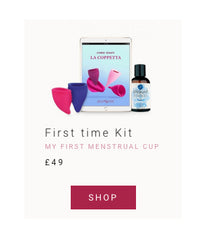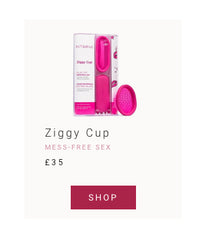Why choosing menstrual cups?
We live in a society in which people who menstruate - we’d like to remind you that not all people that menstruate refer to themselves as women - will find many different options to use as support for periods, if you can afford to buy them.

Still using disposable pads, even if they contain plastic and cause irritation? Switching to organic solutions - even if still disposable - in order to start to be “greener”? Using reusable pads and period-proof underwear, so that you’ll save money and positively impact on the environment?
Well, one of the most famous “green” solutions since 5-10 years has been the menstrual cup. The name is pretty much self explanatory because it’s precisely a soft cup that, once inserted in your vagina, will collect menstrual blood up to 12 hours (depending on the model, the capacity and your own flow).
________________________________________________________________
You may also like: How to Choose the Right Menstrual Cup
________________________________________________________________
So why should you move to using menstrual cups? We gathered for a list of pros, if you are thinking about taking the plunge and buy one.
- Saving money and being greener: it’s estimated that a woman, during her fertile life, can use from 3 to 10 thousand pads or tampons. In one year, we use between 120 and 480 billions of pads and tampons worldwide. It’s crazy if we think about how much they cost (in the UK the tampon tax has been reduced to 5% but still many countries tax them at 22%, like luxury goods) and how much plastic waste they create - approximately 5kg per woman every year.
- Health and safety: being in 2020 means we know that pads are made of plastic, manufactured with bleaching solutions and many other chemicals that not only can cause irritation to sensitive skin but also should never come into contact with our intimate parts and vaginal flora.

- Comfort: we are not like those people that say that menstrual cups are the one and only solution and that it’s the only way of dealing with your period, but we have to admit it: once inserted, you’ll forget about it in a few seconds. Once you start knowing how to use it and to insert it, it’s perfect even for those who have a very active life and when exercising.
- Hygiene and capacity: you may have heard people complaining about the fact that menstrual cups are not hygienic - totally wrong. Sure, you need to wash your hands before and after inserting it or pulling it out. Plus, menstrual blood, when not coming into contact with air, doesn't stink. And menstrual cups’ capacity is double compared to an ultra absorbent pad - not bad if you are working all day away from home.
+ Discover cups and intimate hygiene
It’s important to underline that it’s a great solution but it’s not always suitable for everybody’ needs. It would be useful to have a good familiarity with your body in order to understand the functioning of your body and the right placement of your cup.
We’d like to be clear on one thing: menstrual cup is a more “intrusive” solution compared to many others, because it has to be inserted inside your body and this could be a problem for some people (people who suffered violence, FGM or that are not familiar with their bodies). Moreover, it’s not indicated for people who have vaginal infections and it should be inserted and pulled out carefully if you are using an internal contraceptive like IUD, in order not to move it.
Using a menstrual cup - that can cost between £20-30 and can last up to 5 years - it’s for sure a solution that will make you save some money and will help the environment a lot; it’s hygienic and comfortable but not for everybody.

On pureeros’ platform, you’ll find a wide selection of the best menstrual cups on the market and many others support for periods. Buying one of them today means helping our fundraising campaign that we launched to help those womxn in severe poverty that can’t afford to buy even disposable pads. For each menstrual cup or period-proof knickers purchased on our website (together with many other products, highlighted with the “period poverty project” label) we will donate £1 to support these people.
We fight everyday to finally make periods a normal “topic”, a topic that can and should be known and taught to any menstruating person.




